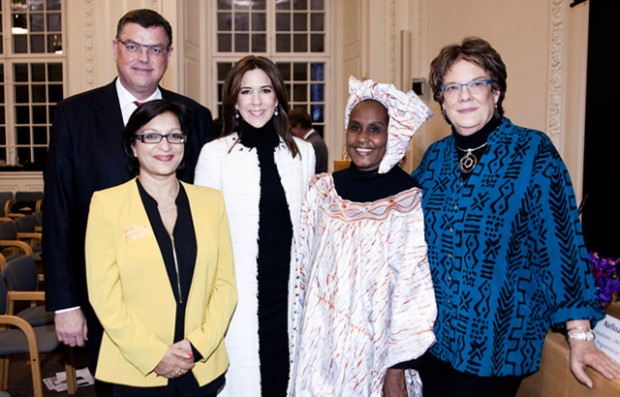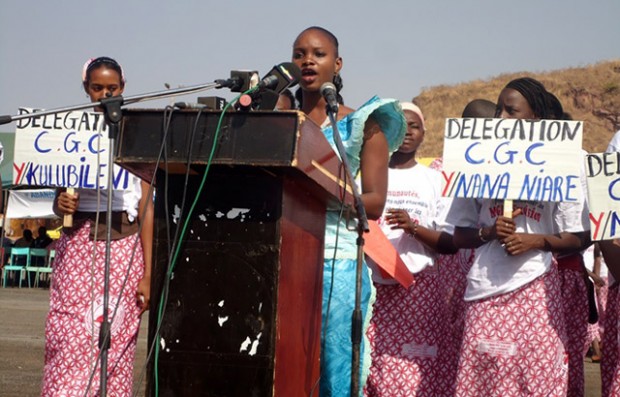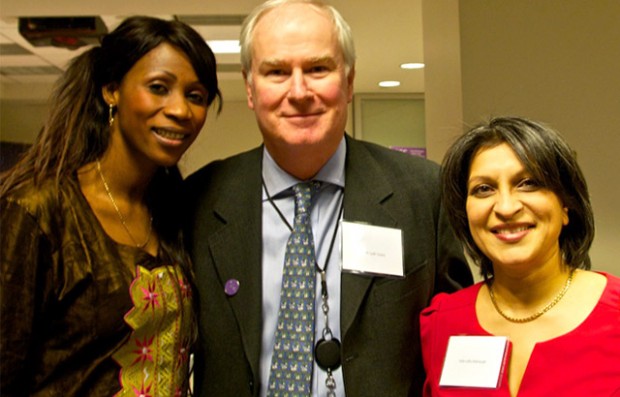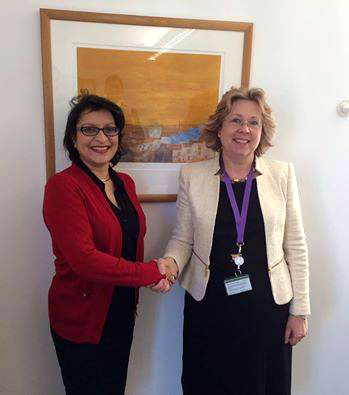“I feel more and more that I am no longer alone and that the entire world is supporting me.” – Mah Cissé
A year ago, 14 communities in Bamako, Mali, declared an end to Female Genital Cutting (FGC). Mah Cissé, a grandmother and community leader, was elected by the communities to help co-ordinate the declaration.
Four months ago, for the first time in her life, Mah Cisse got on a plane. She travelled to Copenhagen, where Orchid Project co-hosted an international conference in the Danish Parliament. The keynote speaker was Her Royal Highness Crown Princess Mary of Denmark; other speakers included ministers from Denmark, Sweden and Norway and the UK Ambassador to Denmark. But the speaker that held the rapt attention of the audience was Mah Cisse and her story of change.

It was Mah’s comment, about no longer being alone, that has stayed with me. There is so much support towards ending FGC now. But sometimes it is important to remind ourselves that those in practising countries believe that cutting their daughters is right and is the only norm they have ever known. The early "change agents" are the ones who are swimming against the tide, until they are joined by others and then a critical mass swim together. It is at that point that a meaningful declaration of ending cutting really becomes possible and signifies a change in practice.
As she says, it was not a simple choice to begin working on ending FGC. “It was a difficult decision. I talked about it (years ago) with my husband and he looked at me and said ‘how do we do this, what do we say?’ I wanted to help other women who wanted to abandon this too, but I didn’t know how.”
“Then Tostan came to my village, and together we studied different human rights that we were entitled to, health information, and problem solving. We also learned about the human right to express our own opinions, and so we decided to go in groups from house to house and we told people about the consequences of FGC. And we decided to declare an abandonment.”

Mah Cisse had years and years of loneliness and confusion, as someone who knew FGC was not a practice she wanted to continue. Her comment is a stark reminder of the reality of how thousands, perhaps millions, feel. Trapped by the powerful norms of their social group, unable sometimes to even question the practice, not allowed to raise their voice for change and knowing that the social sanctions may be extreme. And yet more and more people are swimming against the tide.
This February 6th, the internationally recognised day against FGC, we held an event in New York. It was hosted by the UK Ambassador to the UN, Sir Mark Lyall Grant. Speakers included Kate Gilmore from UNFPA and Geeta Rao Gupta from UNICEF. Together, we spoke of the opportunity for change and paid tribute to the communities who are making the choice themselves. There was a rallying call to ensure that FGC is given the support needed to see it through the next stages in the Sustainable Development Goals (SDG) process.

The show stealer this time was Sister Fa, who, ignoring the relatively sedate backdrop of the UK Consulate, grabbed a microphone and had the audience singing with her. What was interesting in a room filled with ambassadors to the UN was the depth and strength of feeling about the practice. I spoke to representatives from Australia, Grenada, Montenegro, Somalia – all of them united not only to support change, but to ensure that FGC gets its place in negotiations. Given many are at the heart of the SDG process, this is very heartening.
We are now working to explore how other donors can make financial commitments to the movement. Long-term bilateral donors such as Norway, Sweden, Italy and others continue to support various programmes. Importantly, at the Girl Summit, we also witnessed strong commitments from practising countries such as Ethiopia, who pledged to strengthen their own domestic support.

When I was in the process of setting up Orchid Project 4 years ago, February 6th was barely marked in the press. This year there was a huge outpouring of comment, discussion and awareness-raising across the globe. Today, awareness of FGC among the UK public has never been higher. There is also much greater understanding of the wider issues of violence against women and girls, enhanced by high profile events such as V Day and the 1 Billion Rising campaign. One common theme is a determination to put communities first. As 1 Billion Rising states, ‘change can happen if grassroots movements and marginalised communities are in the lead’, which echoes our approach.
This change is led by Mah Cissé and the dynamic Sister Fa. We need to make sure that their stories and voices are heard. The day we aim for at Orchid Project is the day we can talk about FGC in the past tense, but the progress we are seeing gives me renewed hope that we will be able to do this in our lifetime.
———————————————————————————————
Please note, this is a guest blog. Views expressed here do not necessarily represent the views of DFID or have the support of the British government.
Keep in touch. Sign up for email updates from this blog.

3 comments
Comment by Amanda Webster posted on
Female genital cutting is an awful tradition (or whatever) that must stop! You are not alone, girls!
Comment by Brenda Brooks posted on
I absolutely agree, read about this dispicable practice 30 years ago, not many people know much about it, I had to explain to my friends and family they were horrified. I think men want this done to women to keep them submissive, I'm very encouraged that many women are standing together to get this evil practice abolished.
Comment by Oliver posted on
I'm sorry to hear that in these days we still have problems like this 🙁 and I am happy to see people working on it.